- Home
- Herman Melville
Benito Cereno and Bartleby the Scrivener Page 4
Benito Cereno and Bartleby the Scrivener Read online
Page 4
He answered nothing.
"Will you, or will you not, quit me?" I now demanded in a sudden passion, advancing close to him.
"I would prefer not to quit you," he replied, gently emphasizing the not.
"What earthly right have you to stay here? Do you pay any rent? Do you pay my taxes? Or is this property yours?"
He answered nothing.
"Are you ready to go on and write now? Are your eyes recovered? Could you copy a small paper for me this morning? or help examine a few lines? or step round to the post-office? In a word, will you do any thing at all, to give a coloring to your refusal to depart the premises?"
He silently retired into his hermitage.
I was now in such a state of nervous resentment that I thought it but prudent to check myself at present from further demonstrations. Bartleby and I were alone. I remembered the tragedy of the unfortunate Adams and the still more unfortunate Colt in the solitary office of the latter; and how poor Colt, being dreadfully incensed by Adams, and imprudently permitting himself to get wildly excited, was at unawares hurried into his fatal act—an act which certainly no man could possibly deplore more than the actor himself. Often it had occurred to me in my ponderings upon the subject, that had that altercation taken place in the public street, or at a private residence, it would not have terminated as it did. It was the circumstance of being alone in a solitary office, up stairs, of a building entirely unhallowed by humanizing domestic associations—an uncarpeted office, doubtless, of a dusty, haggard sort of appearance;—this it must have been, which greatly helped to enhance the irritable desperation of the hapless Colt.
But when this old Adam of resentment rose in me and tempted me concerning Bartleby, I grappled him and threw him. How? Why, simply by recalling the divine injunction: "A new commandment give I unto you, that ye love one another." Yes, this it was that saved me. Aside from higher considerations, charity often operates as a vastly wise and prudent principle—a great safeguard to its possessor. Men have committed murder for jealousy's sake, and anger's sake, and hatred's sake, and selfishness' sake, and spiritual pride's sake; but no man that ever I heard of, ever committed a diabolical murder for sweet charity's sake. Mere self-interest, then, if no better motive can be enlisted, should, especially with high-tempered men, prompt all beings to charity and philanthropy. At any rate, upon the occasion in question, I strove to drown my exasperated feelings towards the scrivener by benevolently construing his conduct. Poor fellow, poor fellow! thought I, he don't mean any thing; and besides, he has seen hard times, and ought to be indulged.
I endeavored also immediately to occupy myself, and at the same time to comfort my despondency. I tried to fancy that in the course of the morning, at such time as might prove agreeable to him. Bartleby, of his own free accord, would emerge from his hermitage, and take up some decided line of march in the direction of the door. But no. Half-past twelve o'clock came; Turkey began to glow in the face, overturn his inkstand, and become generally obstreperous; Nippers abated down into quietude and courtesy; Ginger Nut munched his noon apple; and Bartleby remained standing at his window in one of his profoundest dead-wall reveries. Will it be credited? Ought I to acknowledge it? That afternoon I left the office without saying one further word to him.
Some days now passed, during which, at leisure intervals I looked a little into "Edwards on the Will," and "Priestly on Necessity." Under the circumstances, those books induced a salutary feeling. Gradually I slid into the persuasion that these troubles of mine touching the scrivener, had been all predestinated from eternity, and Bartleby was billeted upon me for some mysterious purpose of an all-wise Providence, which it was not for a mere mortal like me to fathom. Yes, Bartleby, stay there behind your screen, thought I; I shall persecute you no more; you are harmless and noiseless as any of these old chairs; in short, I never feel so private as when I know you are here. At last I see it, I feel it; I penetrate to the predestinated purpose of my life. I am content. Others may have loftier parts to enact; but my mission in this world, Bartleby, is to furnish you with office-room for such period as you may see fit to remain.
I believe that this wise and blessed frame of mind would have continued with me, had it not been for the unsolicited and uncharitable remarks obtruded upon me by my professional friends who visited the rooms. But thus it often is, that the constant friction of illiberal minds wears out at last the best resolves of the more generous. Though to be sure, when I reflected upon it, it was not strange that people entering my office should be struck by the peculiar aspect of the unaccountable Bartleby, and so be tempted to throw out some sinister observations concerning him. Sometimes an attorney having business with me, and calling at my office and finding no one but the scrivener there, would undertake to obtain some sort of precise information from him touching my whereabouts; but without heeding his idle talk, Bartleby would remain standing immovable in the middle of the room. So after contemplating him in that position for a time, the attorney would depart, no wiser than he came.
Also, when a Reference was going on, and the room full of lawyers and witnesses and business was driving fast; some deeply occupied legal gentleman present, seeing Bartleby wholly unemployed, would request him to run round to his (the legal gentleman's) office and fetch some papers for him. Thereupon, Bartleby would tranquilly decline, and yet remain idle as before. Then the lawyer would give a great stare, and turn to me. And what could I say? At last I was made aware that all through the circle of my professional acquaintance, a whisper of wonder was running round, having reference to the strange creature I kept at my office. This worried me very much. And as the idea came upon me of his possibly turning out a long-lived man, and keep occupying my chambers, and denying my authority; and perplexing my visitors; and scandalizing my professional reputation; and casting a general gloom over the premises; keeping soul and body together to the last upon his savings (for doubtless he spent but half a dime a day), and in the end perhaps outlive me, and claim possession of my office by right of his perpetual occupancy: as all these dark anticipations crowded upon me more and more, and my friends continually intruded their relentless remarks upon the apparition in my room; a great change was wrought in me. I resolved to gather all my faculties together, and for ever rid me of this intolerable incubus.
Ere revolving any complicated project, however, adapted to this end, I first simply suggested to Bartleby the propriety of his permanent departure. In a calm and serious tone, I commended the idea to his careful and mature consideration. But having taken three days to meditate upon it, he apprised me that his original determination remained the same in short, that he still preferred to abide with me.
What shall I do? I now said to myself, buttoning up my coat to the last button. What shall I do? what ought I to do? what does conscience say I should do with this man, or rather ghost. Rid myself of him, I must; go, he shall. But how? You will not thrust him, the poor, pale, passive mortal,—you will not thrust such a helpless creature out of your door? you will not dishonor yourself by such cruelty? No, I will not, I cannot do that. Rather would I let him live and die here, and then mason up his remains in the wall. What then will you do? For all your coaxing, he will not budge. Bribes he leaves under your own paperweight on your table; in short, it is quite plain that he prefers to cling to you.
Then something severe, something unusual must be done. What! surely you will not have him collared by a constable, and commit his innocent pallor to the common jail? And upon what ground could you procure such a thing to be done?—a vagrant, is he? What! he a vagrant, a wanderer, who refuses to budge? It is because he will not be a vagrant, then, that you seek to count him as a vagrant. That is too absurd. No visible means of support: there I have him. Wrong again: for indubitably he does support himself, and that is the only unanswerable proof that any man can show of his possessing the means so to do. No more then. Since he will not quit me, I must quit him. I will change my offices; I will move elsewhere; and give him fair notice,
that if I find him on my new premises I will then proceed against him as a common trespasser.
Acting accordingly, next day I thus addressed him: "I find these chambers too far from the City Hall; the air is unwholesome. In a word, I propose to remove my offices next week, and shall no longer require your services. I tell you this now, in order that you may seek another place."
He made no reply, and nothing more was said.
On the appointed day I engaged carts and men, proceeded to my chambers, and having but little furniture, every thing was removed in a few hours. Throughout, the scrivener remained standing behind the screen, which I directed to be removed the last thing. It was withdrawn; and being folded up like a huge folio, left him the motionless occupant of a naked room. I stood in the entry watching him a moment, while something from within me upbraided me.
I re-entered, with my hand in my pocket—and—and my heart in my mouth.
"Good-bye, Bartleby; I am going—good-bye, and God some way bless you; and take that," slipping something in his hand. But it dropped upon the floor, and then,—strange to say—I tore myself from him whom I had so longed to be rid of.
Established in my new quarters, for a day or two I kept the door locked, and started at every footfall in the passages. When I returned to my rooms after any little absence, I would pause at the threshold for an instant, and attentively listen, ere applying my key. But these fears were needless. Bartleby never came nigh me.
I thought all was going well, when a perturbed looking stranger visited me, inquiring whether I was the person who had recently occupied rooms at No.—Wall-street.
Full of forebodings, I replied that I was.
"Then sir," said the stranger, who proved a lawyer, "you are responsible for the man you left there. He refuses to do any copying; he refuses to do any thing; he says he prefers not to; and he refuses to quit the premises."
"I am very sorry, sir," said I, with assumed tranquility, but an inward tremor, "but, really, the man you allude to is nothing to me—he is no relation or apprentice of mine, that you should hold me responsible for him."
"In mercy's name, who is he?"
"I certainly cannot inform you. I know nothing about him. Formerly I employed him as a copyist; but he has done nothing for me now for some time past."
"I shall settle him then,—good morning, sir."
Several days passed, and I heard nothing more; and though I often felt a charitable prompting to call at the place and see poor Bartleby, yet a certain squeamishness of I know not what withheld me.
All is over with him, by this time, thought I at last, when through another week no further intelligence reached me. But coming to my room the day after, I found several persons waiting at my door in a high state of nervous excitement.
"That's the man—here he comes," cried the foremost one, whom I recognized as the lawyer who had previously called upon me alone.
"You must take him away, sir, at once," cried a portly person among them, advancing upon me, and whom I knew to be the landlord of No.—Wall-street. "These gentlemen, my tenants, cannot stand it any longer; Mr. B—" pointing to the lawyer, "has turned him out of his room, and he now persists in haunting the building generally, sitting upon the banisters of the stairs by day, and sleeping in the entry by night. Every body is concerned; clients are leaving the offices; some fears are entertained of a mob; something you must do, and that without delay."
Aghast at this torrent, I fell back before it, and would fain have locked myself in my new quarters. In vain I persisted that Bartleby was nothing to me—no more than to any one else. In vain:—I was the last person known to have any thing to do with him, and they held me to the terrible account. Fearful then of being exposed in the papers (as one person present obscurely threatened) I considered the matter, and at length said, that if the lawyer would give me a confidential interview with the scrivener, in his (the lawyer's) own room, I would that afternoon strive my best to rid them of the nuisance they complained of.
Going up stairs to my old haunt, there was Bartleby silently sitting upon the banister at the landing.
"What are you doing here, Bartleby?" said I.
"Sitting upon the banister," he mildly replied.
I motioned him into the lawyer's room, who then left us.
"Bartleby," said I, "are you aware that you are the cause of great tribulation to me, by persisting in occupying the entry after being dismissed from the office?"
No answer.
"Now one of two things must take place. Either you must do something, or something must be done to you. Now what sort of business would you like to engage in? Would you like to re-engage in copying for some one?"
"No; I would prefer not to make any change."
"Would you like a clerkship in a dry-goods store?"
"There is too much confinement about that. No, I would not like a clerkship; but I am not particular."
"Too much confinement," I cried, "why you keep yourself confined all the time!"
"I would prefer not to take a clerkship," he rejoined, as if to settle that little item at once.
"How would a bar-tender's business suit you? There is no trying of the eyesight in that."
"I would not like it at all; though, as I said before, I am not particular."
His unwonted wordiness inspirited me. I returned to the charge.
"Well then, would you like to travel through the country collecting bills for the merchants? That would improve your health."
"No, I would prefer to be doing something else."
"How then would going as a companion to Europe, to entertain some young gentleman with your conversation,—how would that suit you?"
"Not at all. It does not strike me that there is any thing definite about that. I like to be stationary. But I am not particular."
"Stationary you shall be then," I cried, now losing all patience, and for the first time in all my exasperating connection with him fairly flying into a passion. "If you do not go away from these premises before night, I shall feel bound—indeed I am bound—to—to—to quit the premises myself!" I rather absurdly concluded, knowing not with what possible threat to try to frighten his immobility into compliance. Despairing of all further efforts, I was precipitately leaving him, when a final thought occurred to me—one which had not been wholly unindulged before.
"Bartleby," said I, in the kindest tone I could assume under such exciting circumstances, "will you go home with me now—not to my office, but my dwelling—and remain there till we can conclude upon some convenient arrangement for you at our leisure? Come, let us start now, right away."
"No: at present I would prefer not to make any change at all."
I answered nothing; but effectually dodging every one by the suddenness and rapidity of my flight, rushed from the building, ran up Wall-street towards Broadway, and jumping into the first omnibus was soon removed from pursuit. As soon as tranquility returned I distinctly perceived that I had now done all that I possibly could, both in respect to the demands of the landlord and his tenants, and with regard to my own desire and sense of duty, to benefit Bartleby, and shield him from rude persecution. I now strove to be entirely care-free and quiescent; and my conscience justified me in the attempt; though indeed it was not so successful as I could have wished. So fearful was I of being again hunted out by the incensed landlord and his exasperated tenants, that, surrendering my business to Nippers, for a few days I drove about the upper part of the town and through the suburbs, in my rockaway; crossed over to Jersey City and Hoboken, and paid fugitive visits to Manhattanville and Astoria. In fact I almost lived in my rockaway for the time.
When again I entered my office, lo, a note from the landlord lay upon the desk. I opened it with trembling hands. It informed me that the writer had sent to the police, and had Bartleby removed to the Tombs as a vagrant. Moreover, since I knew more about him than any one else, he wished me to appear at that place, and make a suitable statement of the facts. These tidings had a con
flicting effect upon me. At first I was indignant; but at last almost approved. The landlord's energetic, summary disposition had led him to adopt a procedure which I do not think I would have decided upon myself; and yet as a last resort, under such peculiar circumstances, it seemed the only plan.
As I afterwards learned, the poor scrivener, when told that he must be conducted to the Tombs, offered not the slightest obstacle, but in his pale unmoving way, silently acquiesced.
Some of the compassionate and curious bystanders joined the party; and headed by one of the constables arm in arm with Bartleby, the silent procession filed its way through all the noise, and heat, and joy of the roaring thoroughfares at noon.
The same day I received the note I went to the Tombs, or to speak more properly, the Halls of Justice. Seeking the right officer, I stated the purpose of my call, and was informed that the individual I described was indeed within. I then assured the functionary that Bartleby was a perfectly honest man, and greatly to be compassionated, however unaccountably eccentric. I narrated all I knew, and closed by suggesting the idea of letting him remain in as indulgent confinement as possible till something less harsh might be done—though indeed I hardly knew what. At all events, if nothing else could be decided upon, the alms-house must receive him. I then begged to have an interview.
Being under no disgraceful charge, and quite serene and harmless in all his ways, they had permitted him freely to wander about the prison, and especially in the inclosed grass-platted yard thereof. And so I found him there, standing all alone in the quietest of the yards, his face towards a high wall, while all around, from the narrow slits of the jail windows, I thought I saw peering out upon him the eyes of murderers and thieves.
"Bartleby!"
"I know you," he said, without looking round,—"and I want nothing to say to you."

 Moby Dick; Or, The Whale
Moby Dick; Or, The Whale Moby Dick
Moby Dick Benito Cereno and Bartleby the Scrivener
Benito Cereno and Bartleby the Scrivener Israel Potter: His Fifty Years of Exile (Annotated Edition)
Israel Potter: His Fifty Years of Exile (Annotated Edition) Billy Budd and the Piazza Tales
Billy Budd and the Piazza Tales Billy Budd, Bartleby, and Other Stories
Billy Budd, Bartleby, and Other Stories Typee: A Romance of the South Seas
Typee: A Romance of the South Seas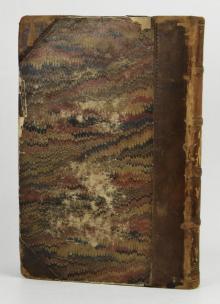 Omoo: Adventures in the South Seas
Omoo: Adventures in the South Seas White Jacket; Or, The World on a Man-of-War
White Jacket; Or, The World on a Man-of-War Redburn. His First Voyage
Redburn. His First Voyage Mardi: and A Voyage Thither, Vol. II
Mardi: and A Voyage Thither, Vol. II Typee
Typee The Paradise of Bachelors and the Tartarus of Maids
The Paradise of Bachelors and the Tartarus of Maids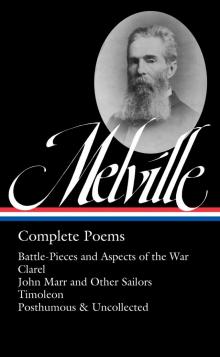 Herman Melville- Complete Poems
Herman Melville- Complete Poems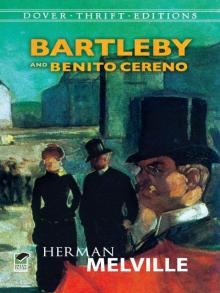 Bartleby and Benito Cereno
Bartleby and Benito Cereno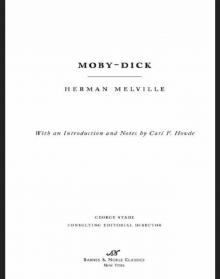 Moby-Dick (Barnes & Noble Classics Series)
Moby-Dick (Barnes & Noble Classics Series) Mardi and a Voyage Thither
Mardi and a Voyage Thither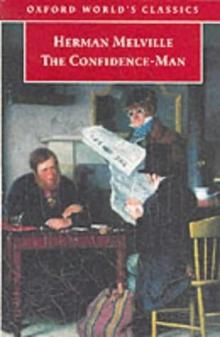 The Confidence-Man
The Confidence-Man Billy Budd and Other Stories
Billy Budd and Other Stories Bartleby the Scrivener
Bartleby the Scrivener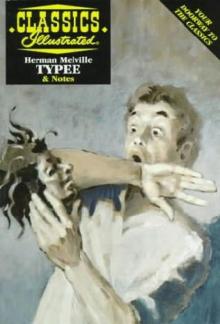 Typee: A Romance of the South Sea
Typee: A Romance of the South Sea I and My Chimney
I and My Chimney Billy Budd
Billy Budd Pierre, Or the Ambiguities
Pierre, Or the Ambiguities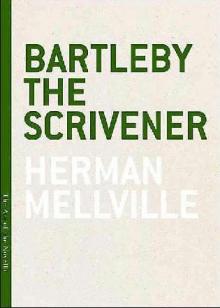 Bartleby, The Scrivener A Story of Wall-Street
Bartleby, The Scrivener A Story of Wall-Street Four Great American Classics
Four Great American Classics White Jacket or, The World on a Man-of-War
White Jacket or, The World on a Man-of-War The Piazza Tales
The Piazza Tales Israel Potter. Fifty Years of Exile
Israel Potter. Fifty Years of Exile